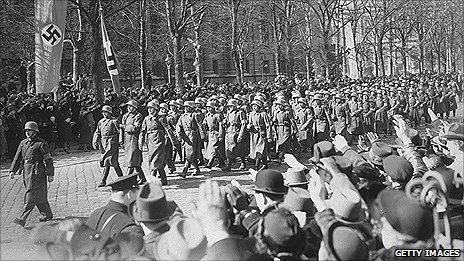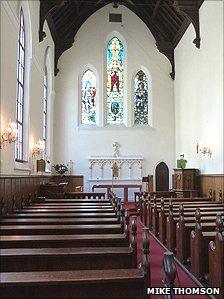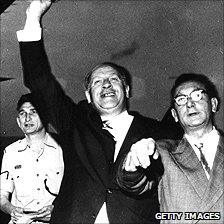The British 'Schindler' who saved Austrian Jews
- Published

In March 1938, a Church of England chaplain set out to save the lives of hundreds of desperate Austrian Jews facing persecution by the Nazis by baptising them as Christians, to help them flee the country.
The controversial work of the Reverend Hugh Grimes - which began the day after Nazi Germany annexed Austria - is little recognised yet it led to what could be called Britain's own "Schindler's list".
It all began with the Anschluss, when Hitler made Austria part of the Third Reich just before the start of World War II.
Thousands of people lined the streets of Vienna to cheer the arrival of his troops, who came officially to unite all German-speaking peoples.
But this was the start of terrible times for the country's Jewish population, then one of the largest in Europe.
Many were beaten in the streets and forced to scrub Vienna's pavements. Hundreds of people are thought to have committed suicide.
Lucien Meysels, now 86, remembers those dark days well.
"As we walked back home, suddenly the mob was coming in - a howling mob, which I've never seen before. Smashing shop windows, just barbaric. That moment we knew we had to get out, and had to get out fast."
Baptism queues
The Reverend Hugh Grimes was chaplain of Christ Church in Vienna, a little piece of England in Austria.

Christ Church was an embassy chapel so Rev Grimes had diplomatic status
Concerned about what he saw happening around him, he came up with a plan.
Before long, the trickle of baptisms at his church - which mainly catered for British embassy staff and other expatriates in the city - turned into a flood.
British artist Christopher Wentworth-Stanley, who lives in Vienna, has been researching this story for many years.
Much of this time has been spent poring over a collection of old blue ledgers belonging to the church.
These contain the many names of Jews baptised there in 1938. There is, he says, a discernable pattern in the timing of these services.
"You can actually fit the baptisms to the chronology of what was going on in Vienna. On the 23 July, the identity card was introduced with a "J" on it.
"On the day after that, 129 people were baptised here. The following day there were 229. I mean, the church itself only sits 125 people."
Before long, baptism queues were forming down the street outside Christ Church.
The reason for all this appears to be the hope that baptism certificates would help the city's increasingly persecuted Jews escape the country.
Historian Giles MacDonogh has been researching how this could work.
"If you had a particularly stroppy border guard, he might have said 'You're a Jew and not an Anglican, and no, you can't leave the country'.
"But in many cases that didn't happen. Providing you had baptismal papers that showed you were not a Jew but a Christian, you could pass into any one of those countries which did not see at that stage - like many countries - that Judaism was not a racial thing but simply a religious matter."
As the numbers of Jews baptised at the Church grew, so did concern among senior members of the Church of England.
They had begun to view this sudden wave of baptisms in Vienna as little more than conversions of convenience, performed for political rather than religious reasons.
When the Reverend Grimes returned to England in the summer of 1938, he was told that he would not be returning to Vienna. But his replacement at Christ Church, the Reverend Fred Collard, continued to baptise hundreds more Austrian Jews.
'Unsung hero'
Little is known about what those in the Jewish religion thought about the controversial conversions back then.

Oskar Schindler was honoured by Israel in 1962
As many as 1,800 Jews had been given baptism certificates before the conversions were finally stopped by an increasingly critical Church of England.
There has been little recognition of what happened since then.
This could be down to concerns about these controversial baptisms among members of both the Christian and Jewish faiths.
It might also be due to the fact that Austria's surviving Jews went to many different places and it is almost impossible to know how much of a role these baptism certificates played in aiding their escape.
But Randy Schoenberg - whose great uncle, Egon Zeisl, escaped from Austria in 1938 - has nothing but praise for the help Vienna's Jews were offered.
Randy, who lives in California, only discovered his uncle's baptism certificate a few weeks ago. He is very keen that what he calls Hugh Grimes' bravery be remembered.
"He was someone with an extremely good heart who saw desperate people in need and offered them at least a hope of escape from Austria. I think he really is an unsung hero of that terrible period."
Randy plans to display the certificate in the Los Angeles Holocaust Museum to help ensure that the deeds of the Reverend Hugh Grimes are never forgotten.
Listen to Mike Thomson's full report in Document on Monday 8 August 20:00 BST BBC Radio 4. Or catch up later on the BBC iPlayer.